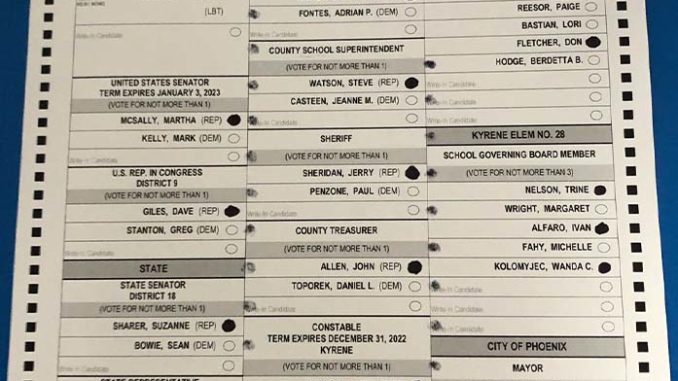
The attorneys representing two Maricopa County voters, several county officials, and three interested parties -including President Trump’s election committee- have been given until Noon on Friday to provide a judge with a joint report on how to move forward a legal challenge known nationally as SharpieGate under a faster-than-normal timeframe.
On Nov. 4, the Kolodin Law Group sued Maricopa County Recorder Adrian Fontes and other county officials on behalf of Laurie Aguilera and Donovan Drobina, who allege they experienced problems on Election Day due to the Sharpie pens voters were given to use. Both claim the machines which were to read their ballots instead rejected the ballots.
Their Complaint for Special Action seeks a court order from Judge Margaret Mahoney of the Maricopa County Superior Court requiring county officials to identify all Election Day ballots which had problems connected to the use of Sharpies and then allow voters to cure any problems. It was filed in Aguilera and Drobina’s names, as well as “all those similarly situated.”
During an initial hearing on Thursday, Mahoney granted motions filed by the Arizona Democratic Party, the Republican National Committee, and Donald J. Trump For President Inc. to intervene in the case. She also questioned all the attorneys about their respective positions, given that there are statutory deadlines which must be met by the elections department moving forward.
One hurdle for Maricopa County officials is a declaration signed by one of its own employees who worked at the Paradise Valley Mall polling station on Nov. 3. The employee estimated about 80 percent of the ballots at that location experienced issued being read by voting machines.
Despite questions from the judge, the Maricopa County Attorney’s Office never addressed the elephant in the room – that being how many Election Day ballots have been completely rejected so far and how many other voters have had some of their votes not counted for certain races.
That was a question Arizona Attorney General Mark Brnovich asked Wednesday in a letter to the Maricopa County’s Elections Department seeking answers about what transpired Tuesday. The request, addressed to Scott Jarrett, director of Elections Day and Emergency Voting, included a deadline of Noon on Thursday for the response.
However, the Maricopa County reply ignored the spirit of the “how many” question. Yet despite the lack of specifics, the Maricopa County response apparently satisfied Brnovich.
“Based on correspondence and conversations with Maricopa County officials, we are now confident that the use of Sharpie markers did not result in disenfranchisement for Arizona voters,” he tweeted Thursday. “We appreciate the county’s prompt insight and assurances to address public concerns.”
The Maricopa County response to Brnovich was issued around Noon, long before Thursday’s 3:30 p.m. hearing. It was not, however, shared at the time with the attorneys representing the plaintiffs.
One of the attorneys, Sue Becker, argued to Mahoney that it would take several days to determine the information the plaintiffs need to prove their case.
That information -which includes how many ballots required special handling and may not have been counted- is needed as soon as possible “to get our arms around the size of the problem,” said Becker, who is with the Public Interest Legal Foundation.
Another question the plaintiffs hope to get answered is whether the problems with voting machines was more prevalent in traditionally Republican communities of Maricopa County.
Attorney Alex Kolodin learned of Brnovich’s tweet after Thursday’s court hearing. He told Arizona Daily Independent he did not understand “the rush to judgment by government officials to take the word of other government officials.”
Court records show Aguilera says she was provided a Sharpie by a poll worker. She completed her ballot, noticing some of her oval fillings appeared to bleed through.
The complaint alleges Aguilera fed her ballot into the ballot machine, but the machine would not “properly register her vote.” She also alleges a poll worker did something “to cancel” that ballot.
“Plaintiff requested a new ballot but, upon information and belief, upon consultation with the Maricopa County Recorder’s Office, the poll workers refused to provide her with one,” the complaint alleges.
Public records show Maricopa County had nearly 2.6 million eligible voters for the general election. It’s unclear whether any of the alleged Sharpie bleed-through problems occurred during early in-person voting prior to Nov. 3.
Also on Thursday, an official with the Department of Homeland Security issued a statement calling claims of invalidated ballots “false” and urged an end to disinformation about SharpieGate.
The special action against Maricopa County appears to have also caught the attention of Gov. Doug Ducey, who issued a statement Thursday afternoon about the ongoing counts.
Ducey assured Arizonans that elections officials are “following established law to the letter” and that no last-minute procedure changes have been enacted and no judges have gotten involved in the counting process.
“In Arizona, we count votes received up until Election Day,” he wrote. “That’s it.”
